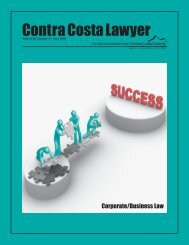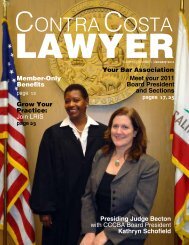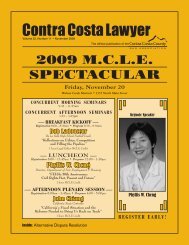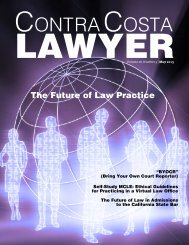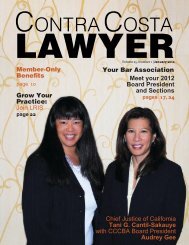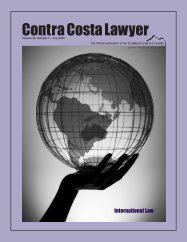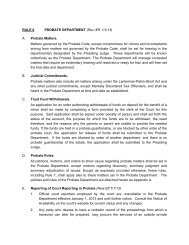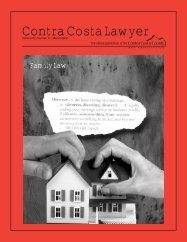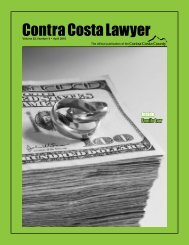download - Contra Costa County Bar Association
download - Contra Costa County Bar Association
download - Contra Costa County Bar Association
You also want an ePaper? Increase the reach of your titles
YUMPU automatically turns print PDFs into web optimized ePapers that Google loves.
Elder Abuse Litigation<br />
Will & Trust Litigation<br />
• Conservatorships<br />
BARR & BARR<br />
ATTORNEYS<br />
318-C Diablo Road • Danville, CA 94526-3443 • (925) 314-9999<br />
Edward E. <strong>Bar</strong>r (retired)<br />
Loren L. <strong>Bar</strong>r*<br />
Christopher M. Moore<br />
Konstantine A. Demiris<br />
Tracey McDonald, Paralegal<br />
*Certified Specialist, Estate Planning, Trust and Probate Law, The State <strong>Bar</strong> of California Board of Legal Specialization<br />
dependent in light of her continuing relationship with<br />
her school at the time of the accident. But the appellate<br />
court, citing out-of-state cases on the same subject, held<br />
that the plain meaning of “full-time student” is “attending<br />
classes on a substantial basis.” Since the daughter<br />
had not met this requirement for the quarter in question,<br />
the court granted summary judgment in favor of<br />
the insurance company, and denied the daughter’s<br />
claim, finding that she was not a qualified dependent.<br />
Fortunately, prior to adoption of the Equality Act,<br />
there were no appellate cases which had to construe<br />
similar factual permutations of a partner’s status that<br />
might arise during a domestic partnership (part-time<br />
residency, lack of financial dependency on the other<br />
partner, etc.), in conjunction with this sort of murky notion<br />
of dependent status. The outcome would have been<br />
less than predictable, had such cases arisen.<br />
According to one commentator, these ambiguities<br />
caused real world problems for domestic partners:<br />
“Without a uniform definition [of dependency], confusion<br />
often resulted in the area of health insurance and<br />
domestic partners were routinely denied benefits and<br />
coverage, or were forced to pay higher premiums.” 7<br />
Under the Equality Act, there is now a “bright line”<br />
test: the domestic partner is indeed entitled to equal<br />
coverage as the named insured, without condition, and<br />
without the need for interpretation of dependency status.<br />
For this reason, if nothing else, the Equality Act has<br />
served its purpose: premiums can be calculated based<br />
upon the known status of a domestic partner; and domestic<br />
partners can be assured of the right to the same<br />
insurance contract health benefits purchased by their<br />
partner, or by their employer on their behalf. A longer<br />
term question will be to what extent, over time, these<br />
health insurance rights of registered domestic partners<br />
might become subject to preemption by either law or<br />
regulation under ObamaCare. s<br />
1<br />
Family Code § 207(a).<br />
2<br />
Family Code § 207.5.<br />
3<br />
Ins. Code, § 381.5, et seq.<br />
4<br />
Cal. Health & Safety Code § 1374.58(a).<br />
5<br />
Ins. Code, § 10700(e).<br />
6<br />
Prudential Ins. Co. of America, Inc. v. Superior Court (2002) 98<br />
Cal.App.4th 585, 600<br />
7<br />
Meredith A. Felde, California Insurance Equality Act: Providing<br />
Equal Insurance Coverage to Domestic Partners (2005) 36 Mc-<br />
George L. Rev. 917, 920.<br />
Ralph L. Jacobson is a founding partner of, and now<br />
of counsel to, the law firm of Gillin, Jacobson, Ellis,<br />
Larsen & Lucey in Orinda.<br />
CONTRA COSTA COUNTY BAR ASSOCIATION CONTRA COSTA LAWYER 27




